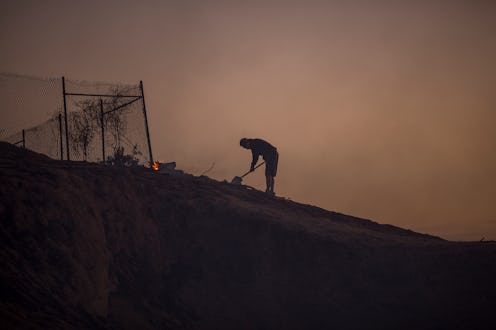News
This Is What You Need To Know About Climate Change & The California Wildfires

While most Americans were on vacation when the Trump administration quietly released its National Climate Assessment on Friday, thousands of California wildfire victims spent the holiday weekend homeless. Combined, the state's Camp and Woolsey Fires decimated a minimum 16,000 structures and killed at least 88 people. Now, experts suggest acknowledging how climate change and the California wildfires are linked is vital to fully understanding how these blazes became so destructive in the first place — and how they could be even worse in the future.
In California's Butte County, the Camp Fire burned over 153,000 acres, while the Woolsey Fire nearly 500 miles south cleared well over 96,000 acres, ABC reported Sunday. Though both fires have been contained, nearly 300 people are still missing in Butte County, according the Washington Post. Even before the aftermath was fully realized, the Northern California blaze was labeled the most destructive and deadliest fire in the state's history.
Trump immediately blamed the havoc on forest management. But environmental policy and climate change experts provide more accurate explanations that touch on drought.
"Scientists can’t quantify the degree to which climate change influenced the recent wildfires," environmental scientists Lara Kueppers tells Bustle. "But the types of conditions that led to the fires are becoming more prevalent as the climate warms." Kueppers is an assistant professor in UC Berkeley's Energy and Resources Group and researches ecological responses to climate change.
Due to climate change, she explains, "warm temperatures extend over a larger portion of the year." This, in turn, causes vegetation to dry out more quickly and for sometimes longer periods of time. "That essentially lengthens the fire season," she adds. "And the moisture in that vegetation has a lot to do with whether that fire will spread." In fact, according to the National Integrated Drought Information System, California has been in a drought since December 2011, impacting over 35 million people across the state.
As Kueppers makes clear, scientists fully understand that "periods of drought have been known in California’s history for millennia." Climate variability absolutely exists under natural circumstances. However, that doesn't mean California's current drought conditions are normal. Greenhouse gases are "leading to this change in the climate that’s happening really, really rapidly compared to the rate of change under more natural conditions," Kueppers says. And that's where humans come in. According to the Intergovernmental Panel on Climate Change, the EPA noted, humans are responsible for nearly all of the increase in greenhouse gases in the atmosphere over the past 150 years.
Leah Stokes, an assistant professor in UC Santa Barbara's Department of Political Science, is adamant that political change needs to happen if the country wants to cut down on those emissions. "Climate change is one of the most polarized issues in American politics," she tells Bustle. "This isn’t really about beliefs — it’s about facts." Stokes, whose research centers on energy and the environment, is also affiliated with the Bren School of Environmental Science & Management and the Environmental Studies Department.
Though some wildfires certainly happen naturally in California — and are even healthy for the ecosystem — the facts suggest the rate and intensity at which they're occurring are unprecedented. A 2016 National Academy of Sciences study by John T. Abatzoglou and A. Park Williams, for instance, estimated that "human-caused climate change contributed to an additional 4.2 million hectares of forest fire area during 1984–2015." That's double the area that would've burned under more natural conditions. The same authors concluded that, in addition to natural climate variations, global warming caused by humans had "substantially increased" the likelihood of extreme droughts in California leading into 2015.
According to Stokes, the time to start calling your representative about these issues, and to start advocating for a carbon taxes, is now. Her hope is that people begin personally identifying with climate change after the wildfires. "I really think that until people realize that they are already paying the cost, that they aren’t really going to be willing to do what’s necessary to transform the energy system."
Humans and the environment we occupy are inextricably linked and, as a result, what affects one will impact the other. Stokes insists, "Everybody needs to wake up and hold people [legislators] accountable and start making this the wartime effort that it really needs to be." Because if droughts continue to intensify as the planet heats up, wildfires — and other natural disasters — could become even more destructive as well.